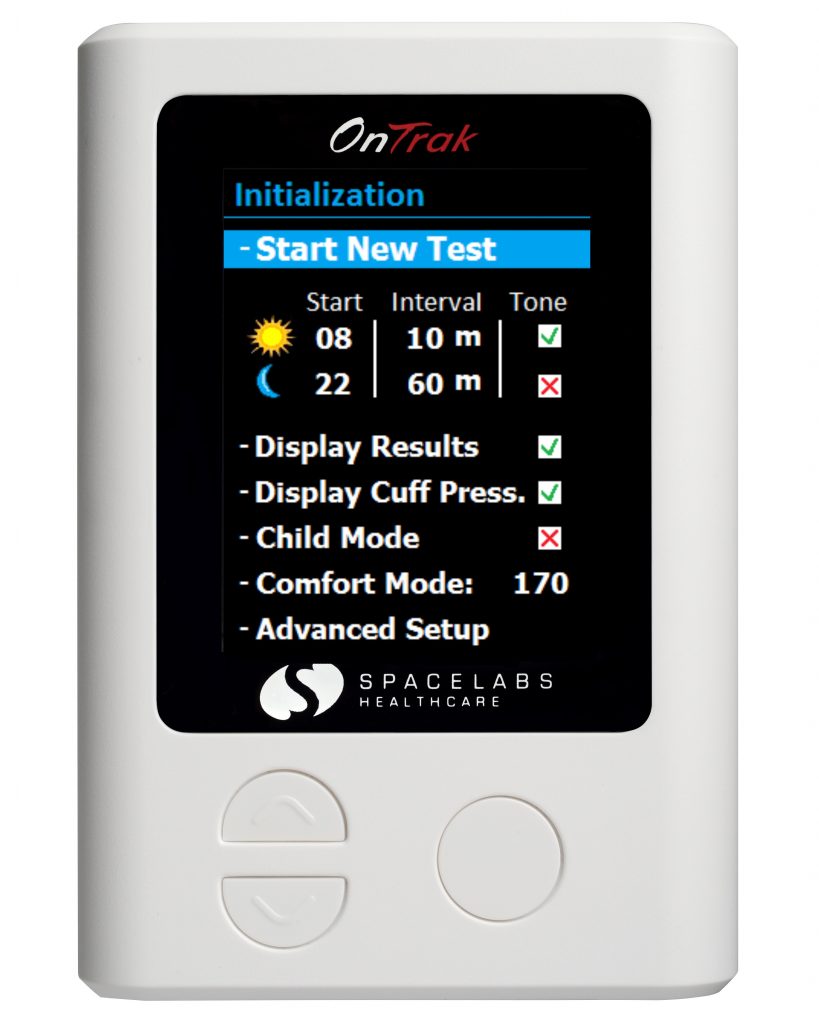ABP monitoring
Ambulatory blood pressure monitoring (ABPM) is the most cost-effective monitoring strategy.
Compared with other dietary, lifestyle, and metabolic risk factors, high blood pressure is the leading cause of death in women and the second-leading cause of death in men.1 Findings of a study suggest that ambulatory blood pressure monitoring (ABPM) is the most cost-effective monitoring strategy for most adults regardless of their initial clinic blood pressure screen results.2
With over 60 years of clinical expertise and ongoing innovation, Spacelabs’ latest generation ABP monitor product has been comprehensively tested and validated against the three most recognized international protocols to better serve your clinical needs.
Combined with the Sentinel cardiology information management system, our ABPM solutions provide a secure and scalable solution for all your hypertension needs regardless of clinic location.

OnTrak
Spacelabs latest generation ABPM has been validated against the three most recognized international protocols and designed with innovative new features such as Child mode and Comfort mode to reduce patient anxiety and increase compliance. With many clinical references, Spacelabs blood pressure monitors have been the equipment of choice for blood pressure monitoring in clinical studies and research.
90217A
Our proprietary algorithm has been proven in over 20 years’ use in pediatric, adolescent, adult and elderly patients with a variety of disorders. Researchers have selected Spacelabs Healthcare’s ABP monitors for more than 500 clinical studies, including the landmark DASH, SYST-Eur and AASK** analyses.3
Which of your patients could benefit from ABPM?
According to the JNC VII Guidelines, Ambulatory Blood Pressure Monitoring (ABPM) is warranted for patients with “white-coat” hypertension – 20 to 35% of patients who are hypertensive in your office may be normotensive at home.
JNC VII also suggests that ABPM aids in assessing patients who:
- are not responding to antihypertensive therapy
- are taking antihypertensive medication and are experiencing symptoms of hypotension
- have episodic hypertension
- have autonomic dysfunction
ABPM is a proven, reliable tool:
- ABPM data correlates better than office measurements with target organ injury
- ABPM illustrates the extent of blood pressure (BP) reduction during sleep; persons whose BP doesn’t drop at night are at increased risk for cardiovascular events
- Recent studies suggest that ABPM data more accurately reflects a patient’s actual BP than casual or in-office BP measurements
- Availability of ABPM data improves the physician’s ability to predict cardiovascular risk
- ABPM data diagnoses masked hypertension
- Increasingly ABP is being used in pediatrics in accordance with the guidelines for the screening and management of high blood pressure in children and adolescents4
Not all products are available for sale in all countries. Please contact your local Spacelabs Healthcare representative or regional office for more information.
References
-
- Heart Disease and Stroke Statistics—2016 Update, e188
- Comparative Cost-Effectiveness of Clinic, Home, or Ambulatory Blood Pressure Measurement for Hypertension Diagnosis in US Adults, HYPERTENSIONAHA.118.11715
- DASH – Dietary Approaches to Stop Hypertension, SYST-Eur – Systolic Hypertension in Europe, AASK – African American Study of Kidney Disease and Hypertension
- The Fourth Report on the Diagnosis, Evaluation, and Treatment of High BP in Children and Adolescents